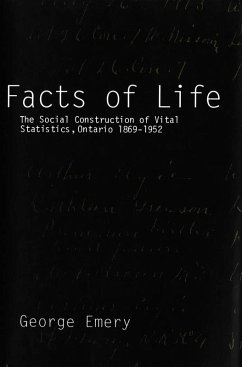Emery's central argument is that scholars must recognize the social historical character of the statistics before using them as a basis for research. He defines "e;social"e; broadly to include both an external component (the ideologies, concerns, and processes in society that influenced civil registration officials) and an internal component (the complex way officials organized civil registration, which greatly affected the statistics). Thus he treats statutes, regulations, the content of registration forms, and definition of significant terms as part of the social history of the statistics, not as technical background material. The issues treated include the incomplete registration of vital events, the influence of different definitions of "e;live birth"e; on statistics for infant deaths, the nature of statistics for death by cause, and the problem of "e;residence"e; - the difference between vital events occurring in a municipality and those involving its residents. Emery places Ontario's vital statistics in the context of the international statistics movement and the development of the province's registration system. He then provides empirical illustrations of how aspects of definition influence the data and suggests strategies for responding to such problems. The chapter providing a case study of the completeness of mortality registrations for 1869 to 1972 was prepared in collaboration with Kevin McQuillan.
Dieser Download kann aus rechtlichen Gründen nur mit Rechnungsadresse in A, B, BG, CY, CZ, D, DK, EW, E, FIN, F, GR, HR, H, IRL, I, LT, L, LR, M, NL, PL, P, R, S, SLO, SK ausgeliefert werden.









